November 15, 2025
Cobb Energy Performing Arts Centre
Atlanta, Georgia – USA
Philip GLASS: La Belle et la Bête
Ryan McAdams, conductor; Benjamin Beckman, assistant conductor; Philip Glass, composer; Jean Cocteau, filmmaker. Cast: Kayleigh Decker (Belle), Hadleigh Adams (The Beast / Officer DuPort / Avenant / Ardent), David Crawford (Le Pere / L’Usurier / Ludovis).
Howard Wershil | 20 NOV 2025
What if you could choose a film, any film, and replace its music with a score of your own choosing? How would your peers, your audience, your public, regard such a bold act? Would they cheer? Would they chastise you for blemishing a sacred visual creation? Or for robbing another composer of his precious and rightful voice?
Now, what if that film and your sonic substitutions were separated by decades? What if the honored filmmaker had already passed? And what if that film were considered one of the most visually stunning and innovative films of its era?
And then, what if the composer choosing to replace the score to that film with his own unique musical signature were widely considered one of the finest, most innovative composers of his day, whose own talents and breadth of achievement were well-established, beyond doubt?
What would you think? What would you say?
I’d say we should all be thankful and worship our precious universe for providing us with this singular phenomenon. The pairing of Jean Cocteau’s magnificent film, La Belle et la Bête (“The Beauty and the Beast”), with the extraordinary compositional skills of Philip Glass is brought to life through the remarkable talents of The Atlanta Opera and its “Discoveries” series, providing us all with an event of extraordinary wonder and fanciful whimsy.
Jean Cocteau’s cinematic masterpiece, filmed in black and white, infused with magic, surrealism, and dreamlike images, endowed with deep emotional sensitivity and an almost hypnotic pacing, still stands today as an inspiration to filmmakers worldwide. How can I describe its presence? We begin with rather typical imagery from a time of lords and nobles whose fortunes have waned and whose sentiments are bleak. But once the domain of The Beast is beheld, this imagery gives way to a fantastical world of random smoke, lit candles held by arms attached to walls like bizarre sconces of flesh and sinew, animated statues offering stolen glances and sinister smiles, and so much more. Yet the plot develops as one might expect, as a time-honored tale of unanticipated affection, surprising kindness, unwarranted cruelty, and poor decisions yielding unexpected consequences; in short, yet another valuable tale of the human condition, highlighting situations fraught with candor yet punctuated with humor. The juxtaposition of real and surreal is stark and mind-expanding. I cannot tell you more; you must see it for yourself.
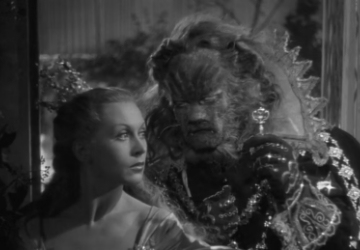
Film still: In a pivotal moment, the Beast entrusts Belle with the key to his mysterious world.
As one might expect from candor punctuated with humor, there were moments during the movie where the audience laughed. At times, the laughter was understandable to me, but at other times I found myself wondering where some of the audience were finding the humor. Ultimately, I chalk it up to a difference in interpretation between generations. Perhaps my generation has had life experiences, through parents and grandparents, that are close enough to those experienced by the movie’s characters, that I was able to find the characters’ behavior in these moments understandable and acceptable. Maybe, for a younger generation, these same behaviors are simply regarded as historically hysterical. I do wonder.
The idea of taking such a period gem of our cinematic history and providing it with a contemporary (21st-century) score is certainly a bold gesture, to say the least. From the opening credits and all points going forward, the music provided to this film by Philip Glass seems as expansive as ever, with wide contrasts of phrasing, harmony, and dynamics indicating a mature musical language aptly fit for accompaniment to this film. The setting of the dialogue certainly provided no limitations for the vocalists’ full expression of emotional, operatic range. It was glorious to hear while enjoying the movie.
Ironically, however, the experience of hearing this application of contemporary music to a decades-older film also makes me curious to watch the movie in its original form, without Glass’ accompaniment. What did the original film score sound like in comparison to the Philip Glass version? I certainly have some research to do, and perhaps you do as well.
The repetitive structures provided in Glass’ score are quite remarkably varied, and often delightfully inspired, but is the score rich enough to handle the entire range of wonder and emotion expressed in this film? Did the original film score achieve that goal? Is it even the responsibility of a film score to do so? It could be argued that a cinematic creation does itself provide the sense of wonder and breadth of emotion that the accompanying music cannot—and indeed should not—convey on its own. It could also be argued that the wedding of score and cinema—of sound and vision—is a melded experience, with each component capable of contributing to or detracting from the ultimate value of the experience at large, depending on the gifts of the creators involved. That said, I certainly found no detractions from either component here. I’m sure that, for some, the odd combination of eras and styles may have been confusing, but I believe that most of the audience found the combination amusing, clever, and ultimately delightful.
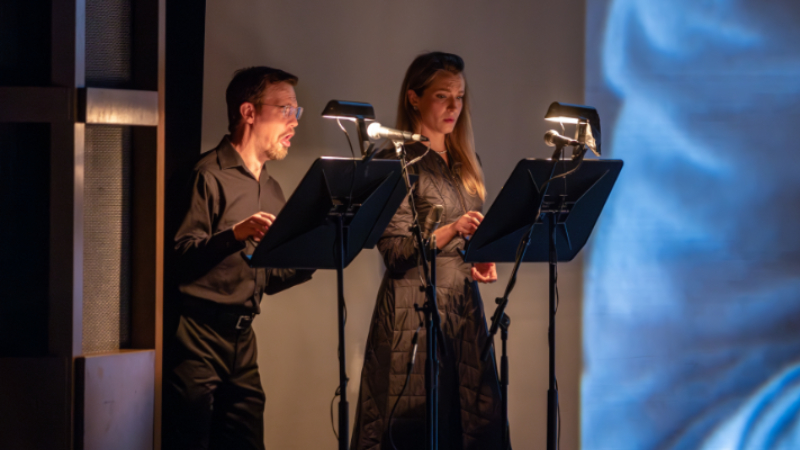
David Crawford, left, singing La Père/L’Usurier/Ludovis, and Kayleigh Decker, singing Belle. (credit: Raftermen)
The dialog for the movie is sung in the original French by four of The Atlanta Opera’s finest: mezzo-soprano Kayleigh Decker (Belle), baritone Hadleigh Adams (The Beast / Officer DuPort / Avenant / Ardent), bass-baritone David Crawford (Le Pere / L’Usurier / Ludovis), and soprano Alexis Seminario (Felicie / Adelaide), while subtitles in English are projected above the action. The four vocalists were positioned as couples, far to either side of the stage, engaging in no interaction with each other, but rather only with the movie, unobtrusively, providing dialogue as needed. Perfect vocal alignment with the lips of the movie’s characters seems statistically impossible, but these fine professionals achieved it beyond expectations. Each Atlanta Opera performer’s talents matched the characters they portrayed beautifully, convincing us all that we could have been listening to the film’s actors’ and actresses’ own vocalizations.
Credit must also be given to conductor Ryan McAdams, a strong contemporary music advocate; assistant conductor Benjamin Beckman; and all of the orchestra’s fine musicians, whose rendition of Philip Glass’ score was nothing short of superb.
Finally, credit must be given to general and artistic director Tomer Zvulun, whose drive and vision are bringing such amazing wonders to Atlanta-area audiences. May his efforts continue to create gifts for the entire community.
The entire evening’s experience was nothing less than bedazzling. But the evening wasn’t only about the movie and the music. Given that a masked ball was scheduled following the performance, the audience included individuals attired in everything from casual wear to formal attire to brilliant preparations for the ball to follow. To set the mood for both the performance and the ball, entering patrons were greeted by an occasional dancer gliding through the lobby and by stations where highly artistic face painting could be enjoyed by those who chose to indulge. For the entire evening, I found myself, along with the audience, engulfed in a rare sense of delight and enchantment seldom encountered.
Sometimes it’s not just about the music. Or the film. Or the dance. Or the play. Or the attire. Or the location. Or the prestige. Sometimes it’s about the combination of all the elements, of the exultation of the entire event, in the experience, in the sensations, the ambiance, the social milieu, the entertainment, the awe, the delight, the escape. We all seek a rewarding quality of life, with moments to remember and fondly cherish. And occasionally, as with tonight, we’re gifted with those such moments that can transport us outside of ourselves, and into another realm. As with the world of The Beauty and The Beast, where expectations are challenged, and fear yields to love, such experiences can leave us with a conviction that we all can do better, be better, are better, and will continue to be so, maybe, just maybe, forever.
Could this be what enchantment—what magic—is really all about?
You tell me. ■
EXTERNAL LINKS:
- The Atlanta Opera: atlantaopera.org
- Kayleigh Decker: kayleighdecker.com
- Hadleigh Adams: hadleighadams.com
- David Crawford: davidcrawfordbass.com
- Alexis Seminario: alexisseminario.com
- Ryan McAdams: ryan-mcadams.com
- c: benjaminbeckmanmusic.com

Read more by Howard Wershil.

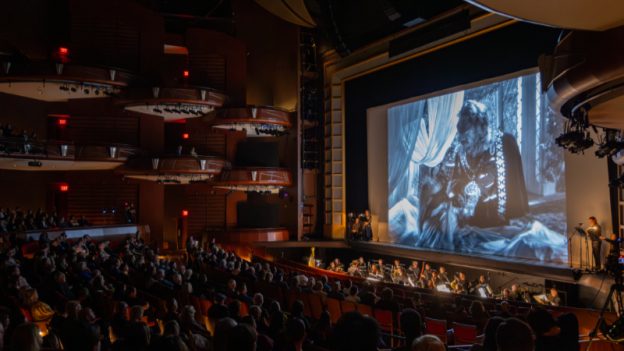
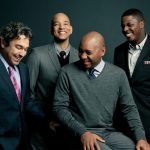

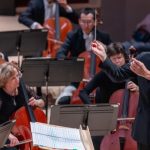
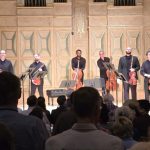
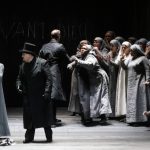
.png)